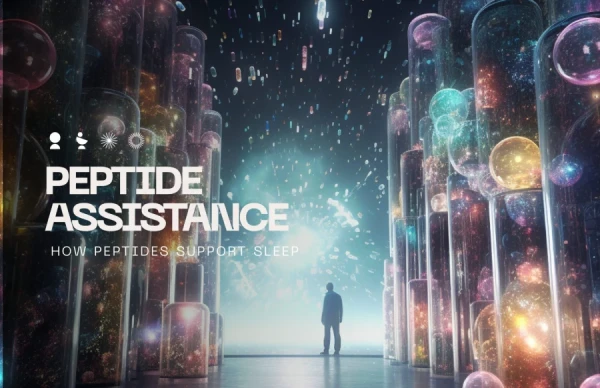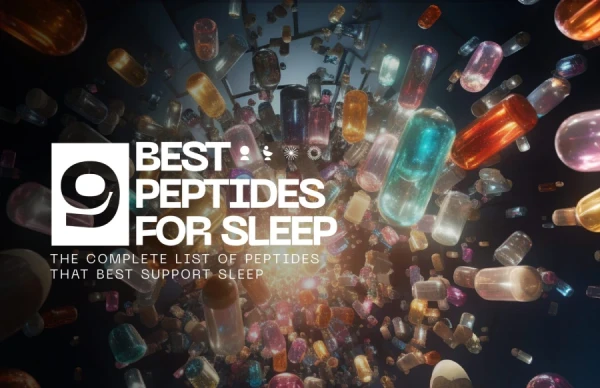Blog
What is the best peptide for sleep

Contents
What causes sleep deprivation?
How do peptides support sleep?
9 best peptides for sleep
Lifestyle factors for better sleep
Getting started with peptide therapy for sleep
From struggle to slumber
Peptides for sleep are molecules that might sound like magic to an exhausted mind. These compounds could eliminate your sleeplessness at the molecular level.
Getting regular sleep helps your well-being, yet deprivation is a prevalent concern. While good behavior practices are crucial, they’re often not enough.
Emerging research suggests peptides might offer an efficient, longer-lasting cure. The more we learn about them, the more optimistic we become. Would you like to give them a try?
Join us to learn everything about sleep peptides. We explain their underlying mechanism and share the top nine treatment options. We then discuss advice for making the most of this form of therapy.
What causes sleep deprivation?
Sleep deprivation is the condition where you consistently fail to get enough sleep. It can cause poor cognitive function, mood, and physical health.
Most adults need 7–8 hours of uninterrupted sleep each night. Occasionally getting less isn’t a big deal, but it turns into a problem if it becomes your norm.
Deprivation isn’t a specific disease. It also doesn’t only refer to short rest hours, but also disrupted sleep patterns. The common causes include:
- Poor sleep habits. Alcohol, caffeine, and phones before bed hinder your rest. Super-late nights and early mornings don’t help, either.
- Untreated sleep disorders. Sleep quality can suffer due to apnea, insomnia, narcolepsy, and restless leg syndrome.
- Health conditions. Chronic pain and hormonal disorders can interfere with your rest hours.
- Stress and anxiety. Having mental chatter and reaching a burnout state won’t help you doze off or sleep well.
- Shift work. Inconsistent bedtime and wake-up hours confuse your body, disrupting its circadian rhythm.
- Environmental factors. Noisy, brightly lit environments make it challenging to fall and stay asleep. Uncomfortable bedding contributes to sleep disruption.
How do peptides for sleep enter this picture?
Sleep and wakefulness require coordination between several brain regions. They involve many signaling systems, including peptides.
Peptides regulate various physiological processes that contribute to healthy, restorative slumber. They trigger or supplement natural chemicals that keep us awake or asleep. That’s not all: many also have beneficial effects that indirectly act as sleep aids.
How do peptides support sleep?
Peptides can support sleep by optimizing your physiological processes. They can regulate your circadian rhythm, relax your system, and modulate harmful neurotransmitter activity. Their presence potentially leads to better sleep patterns and quality.
Let’s briefly introduce these compounds to help you understand their function.
Peptides are strings of 2–50 amino acids similar to signaling molecules. They occur in humans and aid many bodily functions, enhancing your overall functioning. Scientists are now aware of over 7,000 natural peptides. They include neurotransmitters, enzymes, and hormones.
Each peptide has a unique task, but many cooperate. Having adequate levels of each is vital to staying healthy and high-functioning.
When used therapeutically, peptides empower the body’s natural healing abilities. They’re among the most effective ways to heal the biological causes of sleeplessness.
Since they vary in function, choosing the best peptide for sleep is an individual pursuit. We’ve already done some legwork and laid out nine effective options.
9 best peptides for sleep
Once you identify an issue or shortage, supplements are the easiest way to restore your body. But these health boosters don’t only provide nutrients, antioxidants, and gut bacteria. Some go deeper and fix up the mechanisms underpinning your health.
Peptides for sleep are in the latter category. These treatments mimic or stimulate your body’s sleep-improving apparatus, making them efficient and all-natural.
Below are the top nine options for folks struggling with sleep.
1. DSIP
DSIP stands for “deep sleep-inducing peptide.” It’s a well-studied neuromodulating peptide that supports sleep and physiological function. Scientists consider it among the highest-efficiency peptides for sleep.
This peptide increases your ability to doze off and remain asleep. It also decreases the intensity of sleep disturbances. For you, this means fewer instances of waking up at night.
The effectiveness of this compound stems from its natural function. Many sleep aids change the duration of REM and NREM sleep, but DSIP maintains the regular rest stages. It only makes them more efficient.
Beyond acting as a sleep aid, DSIP might treat pain, stress, and low testosterone levels. Its antioxidant properties support your overall well-being. It modulates cortisol (stress hormone) production and prompts the production of beneficial hormones.
2. Orexin
Orexin is a neuropeptide that regulates wakefulness and appetite. It causes narcolepsy and insomnia if it’s lacking or disrupted. It’s the best peptide for energy for folks struggling with slumber-related conditions.
Our neurons produce orexin in the hypothalamus. When it’s secreted, it increases activity in the brain’s reward center and keeps us awake. It stimulates the release of dopamine; the hormone associated with reward and pleasure.
According to studies, orexin dysfunction causes sleep disorders. Supplementing it won’t make you fall asleep, but it might optimize your sleep-wake cycle. You stay awake and alert during the daytime and doze off at night.
Other perks of orexin relate to its impact on the mental state. Deficiencies link to inactivity, obesity, poor memory, and depression.
3. Melatonin
Melatonin is a synthetic version of the naturally occurring human hormone. This hormone gets secreted in response to darkness, regulating your sleep-wake cycle. It doesn’t necessarily make you sleep, but calms you and encourages rest.
Melatonin is a sleep peptide because it regulates the body’s internal clock. The pineal gland releases it as light levels start decreasing. It signals it’s time to wind down.
The body produces melatonin, but lifestyle factors might hinder it. Outdoor and blue light confuse the pineal gland, so many people have a shortage of melatonin. Research shows that supplementing can aid people to fall and stay asleep.
Shift workers and folks traveling across time zones can benefit from melatonin. This peptide might reset their internal clocks, helping them adjust to new schedules.
4. Ipamorelin
Ipamorelin is a growth hormone secretagogue and not a classic peptide for sleep. It boosts the production of human growth hormone (HGH). By doing so, it enhances rest and addresses conditions hindering it.
People rarely associate growth hormones with slumber, but these substances are vital. They prolong the most beneficial sleep stage and help you rejuvenate during rest.
This peptide encourages your body to produce more HGH. It causes increased collagen production, cellular repair, bone density, and tissue growth. For you, this means anti-aging, full-body strengthening benefits.
Regarding sleep, a lack of HGH relates to insomnia and disturbances. An added supply may help you rest well and wake up energized.
5. CJC-1295
CJC-1295 is a synthetic growth hormone-releasing hormone (GHRH) analog. Like Ipamorelin, it has numerous uses throughout the human body. It’s been investigated for its beneficial influence on sleep.
This peptide raises your GHRH levels, stimulating the pituitary gland. The gland releases HGH in response: a cascade of physical perks follows. It boosts muscle development, cognition, mood, and fat loss.
As one of the best peptides for sleep, CJC-1295 regulates the circadian rhythm. It ensures the right hormones get secreted at the proper times. As such, it helps you fall asleep when it’s dark and wake up when the sun rises.
According to evidence, Ipamorelin and CJC-1295 work best in combination. Treatments like our CJC-1296 + Ipamorelin enhance the benefits of both peptides.
6. Epitalon
Epitalon is the synthetic version of the epithalamin peptide. The natural version gets produced in the pineal gland, and its primary function is DNA repair. Besides this role, it regulates metabolism and increases hormone responses.
As a supplement, Epitalon increases our production of telomerase. It lets cells reproduce telomeres, protective bits of our DNA. As a result, the body produces new tissues and rejuvenates old ones. This function gives the peptide anti-aging properties.
Some consider Epitalon a “fountain of youth,” but it’s also a sleep peptide. It offers well-rounded health enhancement via the secretion of beneficial hormones. Patients report higher-quality rest after using it.
Epitalon peptide protocols replace the epithalamin we naturally lose with age. It keeps us healthier, younger-looking, and better-rested for longer.
7. Sermorelin
Sermorelin is a synthetic peptide that mimics the GHRH. It increases HGH levels in your bloodstream. This activity indirectly relates to sleep quantity and quality.
This peptide encourages HGH production in your body. Besides promoting muscle growth and weight loss, this hormone affects the sleep-wake cycle.
HGH gets released when you fall asleep, and having more of it can decrease wakefulness. In practice, this means you nod off more quickly. The same study found that HGH may increase your deep sleep cycle.
Sermorelin is among the best peptides for energy and sleep. It might leave you better rested and invigorate you during the day. It’s a well-rounded treatment best suited for folks who lead active lifestyles.
8. Galanin
Galanin is a neuropeptide that controls the central and peripheral nervous system. It regulates various physical processes, including eating, water intake, and pain sensations.
The neuropeptide cooperates with neurotransmitters. It inhibits some signals and strengthens others, giving it anti-anxiety, energy-boosting properties.
We can notice galanin in the ventrolateral preoptic nucleus (VLPO). The VLPO is a small neuron cluster just above the optic section. Studies deduced this peptide reduces anxiety and leads to longer, calmer sleep.
Besides being a peptide for sleep, galanin regulates your mood, appetite, and hormones. It may also act as a pain suppressant, reducing your perception of discomfort. Its effects broadly relate to homeostasis: a state of balance in the body.
9. NPY
NPY (neuropeptide Y) is a neuromodulator for central and peripheral nervous systems. It interacts with nerve cells to regulate hunger, stress, emotions, and rest. Studies found it aids sleep through several mechanisms in the brain.
This neuropeptide governs our sleep patterns, regulating the natural sleep-wake rhythm. It might also induce relaxation, helping people unwind and doze off. As a result, it may improve sleep timing and quality.
Aside from acting as a sleep peptide, NPY might relieve stress. Animal studies suggest it could improve behaviors related to PTSD, depression, and anxiety.
Feeding is another area of activity for NPY. When released or supplemented, it could stimulate hunger and leave you more energized. Its triple mechanism makes it a well-rounded therapy.
Lifestyle factors for better sleep
Peptides go a long way regarding sleep issues, but they’re not a cure-all. We’d be remiss if we didn’t mention lifestyle factors that might promote or decline your hours in bed.
We refer to these habits as “sleep hygiene.” It includes behaviors and environmental factors to be adjusted to encourage rest. Developed in the 1970s, it was a way to aid people with insomnia. But in today’s stressful and tech-laden world, it can help anybody tossing and turning.
Most of the tips we’ll discuss below are commonsensical. We suggest giving them a go before opting for sleep peptides. Then turn to cell-level solutions if they don’t work in isolation.
According to experts, here are the cornerstones of good sleep hygiene:
- Consistent sleep and wake hours. It’s best to go to bed and wake up at the same time each night and morning. This practice should include the weekends.
- A comfortable sleeping space. A bedroom should be quiet, dark, and comfortably warm. Ear plugs and sleep masks can help if your home’s conditions don’t allow this.
- No electronic devices before bed. Remove TVs, smartphones, and computers from your sleeping space. Stop using anything that emits blue light for 30 minutes before you doze off.
- No caffeine, alcohol, or large meals at night. Caffeine is a stimulant that promotes wakefulness, and alcohol fragments your sleep patterns. Indigestion happens when you lie down after a big meal and can make you wake up at night.
- Moving every day. Physical activity depletes your energy levels, helping you fall asleep at night.
What if you follow these tips and still struggle to get well-rested? The best peptides for sleep might be a solution.
Getting started with peptide therapy for sleep
Folks with sleep issues should first consult a medical professional. They can identify whether any health conditions are causing your struggle.
Upon figuring out the root cause, it’s time to find a treatment. And peptide therapy is among the most promising solutions.
Peptide therapy means using supplemental peptides to boost your health. It substitutes declining or dysregulated amino acid levels in the body. Injected compounds play the role of regulators, encouraging healthy physiological processes.
Used under expert supervision, this type of therapy is very safe and non-habit forming. It triggers already existing mechanisms in your body, making it well-tolerated.
The same feature enables long-term use with few to no adverse reactions. These therapies have a “loading” period of around six months before the full effects kick in. But the benefits begin after only several weeks.
Folks seeking sleep aids can rely on LIVV for treatment. We use the best peptides for sleep and cooperate with certified physicians. They examine your situation before suggesting curated solutions. You get expert guidance every step of the way.
First up, we help you choose your peptide. Not every amino acid chain has the same benefits and aids with the same conditions. For instance, comparing Sermorelin vs. Ipamorelin requires weight considerations, as the former can trigger hunger.
That’s why our questionnaire includes detailed inquiries about your current health.
Our medical team is also there to take care of lab tests. That way, we can identify hormone imbalances and avoid faulty solutions.
Although among the best peptides for energy, excessive orexin can cause insomnia. That’s only one example we prevent by being meticulous.
When you choose a treatment option, our membership plan includes patient care coordinators. These experts ensure the protocol’s going as predicted.
Medical professionals at LIVV keep track of your prescriptions, appointments, and blood work. And consistency means safety and success.
Once we have you on an established protocol, we may also combine sleep peptides for the best results. These compounds may cooperate to establish a balance in your body. We can leverage that mechanism to your benefit.
From struggle to slumber
Sleep issues are among the most oft-encountered struggles of the contemporary era. Lights, stress, and overstimulation: an average brain can’t function or rest optimally. Modern problems require modern solutions, and peptides for sleep might be yours.
In sleep science, peptides offer a new, potentially revolutionary avenue. These messengers may influence your circadian rhythm, stress, relaxation, and neurotransmitters. Their functions might address sleep struggles at ground zero.
Before we leave you with an action plan, we have one final point. Sleep is a natural process, and our bodies are good at maintaining it. Attempt lifestyle self-regulation, consult a physician, and test for potential health issues.
Perform these steps, then head to us. The more information, the easier it becomes to tailor your peptide treatment.
Are you ready to get started? Visit LIVV Natural and explore our peptide therapy protocols. We’ll help you find your best peptide for sleep and make the most of it.
Author: Dr. Jason Phan NMD – Founder of LIVV Natural – Anti-aging – regenerative medicine – peptide therapy


